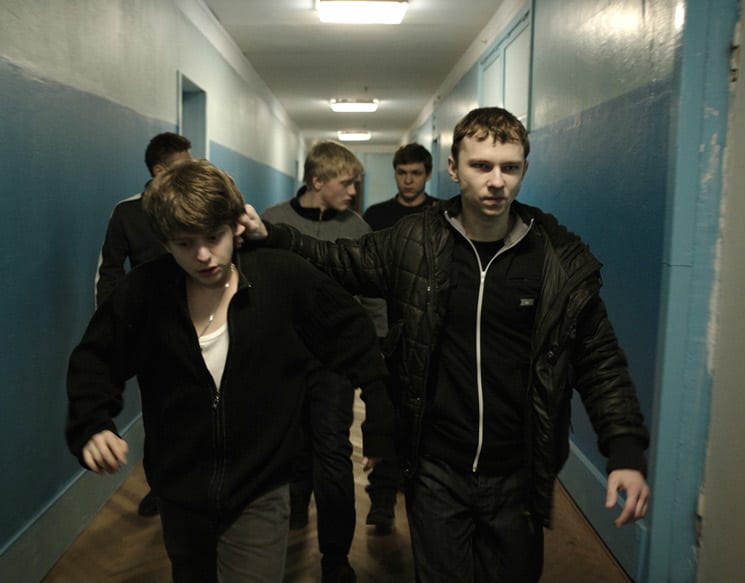Watching The Tribe is an exercise in perseverance.
About 20 minutes into Myroslav Slaboshpytskiy's two-plus-hour, almost completely silent film presented in Ukrainian Sign Language without interpretation or subtitles, I was reminded of another nearly silent film that tests one's patience while beckoning the viewer into an oft-hidden world.
Jeanne Dielman, 23 quai du Commerce, 1080 Bruxelles is a fascinating, repetitive, three-and-a-half-hour 1975 film about the life of a housewife in Brussels. Often heralded as one of the first feminist masterpieces in cinema, Jeanne Dielman is excruciatingly boring — but that's exactly the point. Jeanne's life is so regulated by a complex series of washing, cooking and tidying — and prostituting to a gentleman in the afternoons — that the viewer often feels uncomfortable and fidgety digesting the contents of this woman's day. It feels almost alien despite its ordinariness.
The Tribe initially begins as a similar experience. No one says a word throughout the entire film. Reduced to watching the gestures and body language, the viewer must pay close attention to actions and movement in order to discern what's actually happening. Like Jeanne Dielman, The Tribe takes on a "blink or you'll miss it" quality that makes potentially unimportant scenes crucial.
Our protagonist Sergey (unnamed in the film and played by Grigoriy Fesenko, who is, like the rest of the cast, an untrained deaf-mute actor) arrives at a boarding school in the Ukraine for deaf children. This school seems normal enough; the day begins with a pep rally; the class clown disrupts geography class. But what is silent disruption? Again, body language speaks louder than words here, and characters develop personalities and traits that derive entirely from how they smile, or fight, or walk. It's a particularly insular world, one with its own codified language and unwritten rules, an anthropological look at a private society that trades in violence and sex.
Sergey quickly becomes indoctrinated into a gang of boys at school who deal drugs, beat and mug passengers on trains and prostitute two of their female classmates. When Sergey falls for one (Yana Novikova), he unwittingly begins breaking all the rules of the titular Tribe.
If I have one complaint with The Tribe, it's that the too-thin plot — this short synopsis makes up almost the entire film's contents — can occasionally make the silence a gimmick. Nearly every take is a long shot — a beautiful, raw and striking method when paired with immeasurable violence — that starts to feel distracting and repetitive by the time we reach the fifth or sixth long take of boys going down a staircase. Unlike Jeanne Dielman, this is not a story that needs excessive length to be told.
Still, these are small gripes. The Tribe is ultimately not about plot, but the subtle choreography of violence, and how brutality transcends words — and for the most part, it does so beautifully.
(Films We Like)About 20 minutes into Myroslav Slaboshpytskiy's two-plus-hour, almost completely silent film presented in Ukrainian Sign Language without interpretation or subtitles, I was reminded of another nearly silent film that tests one's patience while beckoning the viewer into an oft-hidden world.
Jeanne Dielman, 23 quai du Commerce, 1080 Bruxelles is a fascinating, repetitive, three-and-a-half-hour 1975 film about the life of a housewife in Brussels. Often heralded as one of the first feminist masterpieces in cinema, Jeanne Dielman is excruciatingly boring — but that's exactly the point. Jeanne's life is so regulated by a complex series of washing, cooking and tidying — and prostituting to a gentleman in the afternoons — that the viewer often feels uncomfortable and fidgety digesting the contents of this woman's day. It feels almost alien despite its ordinariness.
The Tribe initially begins as a similar experience. No one says a word throughout the entire film. Reduced to watching the gestures and body language, the viewer must pay close attention to actions and movement in order to discern what's actually happening. Like Jeanne Dielman, The Tribe takes on a "blink or you'll miss it" quality that makes potentially unimportant scenes crucial.
Our protagonist Sergey (unnamed in the film and played by Grigoriy Fesenko, who is, like the rest of the cast, an untrained deaf-mute actor) arrives at a boarding school in the Ukraine for deaf children. This school seems normal enough; the day begins with a pep rally; the class clown disrupts geography class. But what is silent disruption? Again, body language speaks louder than words here, and characters develop personalities and traits that derive entirely from how they smile, or fight, or walk. It's a particularly insular world, one with its own codified language and unwritten rules, an anthropological look at a private society that trades in violence and sex.
Sergey quickly becomes indoctrinated into a gang of boys at school who deal drugs, beat and mug passengers on trains and prostitute two of their female classmates. When Sergey falls for one (Yana Novikova), he unwittingly begins breaking all the rules of the titular Tribe.
If I have one complaint with The Tribe, it's that the too-thin plot — this short synopsis makes up almost the entire film's contents — can occasionally make the silence a gimmick. Nearly every take is a long shot — a beautiful, raw and striking method when paired with immeasurable violence — that starts to feel distracting and repetitive by the time we reach the fifth or sixth long take of boys going down a staircase. Unlike Jeanne Dielman, this is not a story that needs excessive length to be told.
Still, these are small gripes. The Tribe is ultimately not about plot, but the subtle choreography of violence, and how brutality transcends words — and for the most part, it does so beautifully.
